Key takeaways:
- Mobile operating systems are essential for user interaction and manage resources, applications, and hardware seamlessly.
- Customization and app ecosystem diversity influence user loyalty and satisfaction between Android and iOS.
- Future trends in mobile OS will focus on AI integration, enhanced privacy controls, and sustainability.
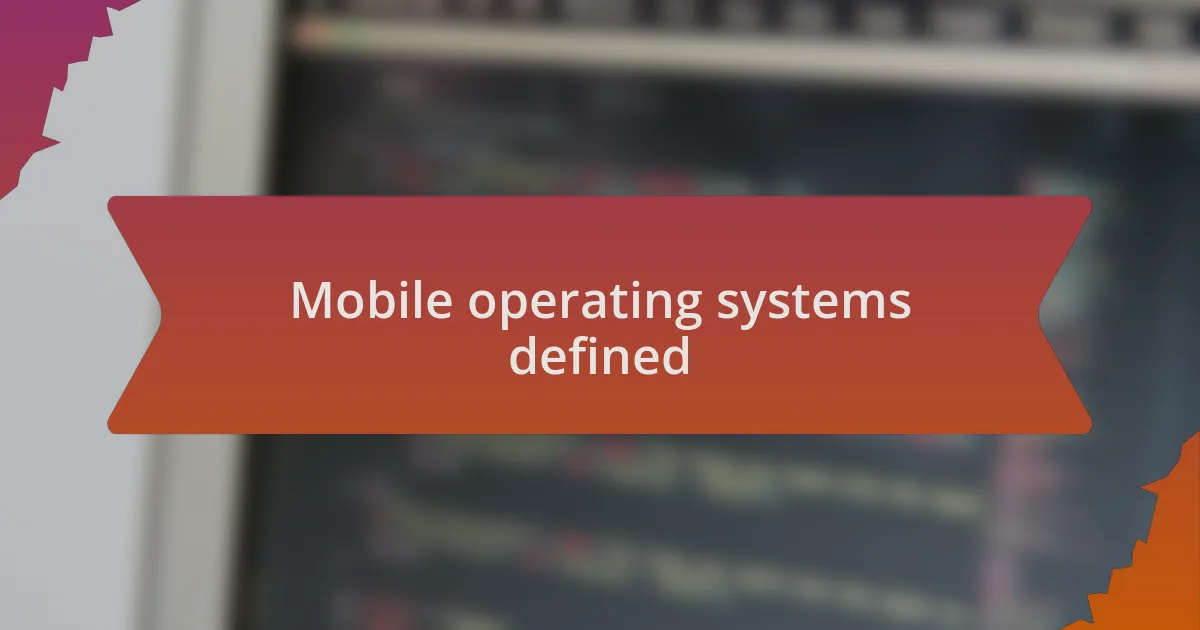
Mobile operating systems defined
Mobile operating systems are the backbone of our smartphones and tablets, acting as the interface between the user and the hardware. I often think about how these systems enable us to connect with the world, from sending a quick message to unlocking the vast potential of apps. Have you ever considered how much we rely on these systems daily?
When I delve deeper into mobile operating systems, it’s fascinating to see how they manage resources, applications, and user interactions seamlessly. For instance, I recall the first time I navigated a smartphone interface; it felt revolutionary. I was amazed at how everything just worked—like magic!
Each mobile operating system, whether it’s Android, iOS, or others, has its distinct characteristics and functionalities. I remember choosing my first smartphone based on the operating system alone, feeling an instant connection to the user experience it offered. Isn’t it interesting how our preferences can shape our entire digital world?
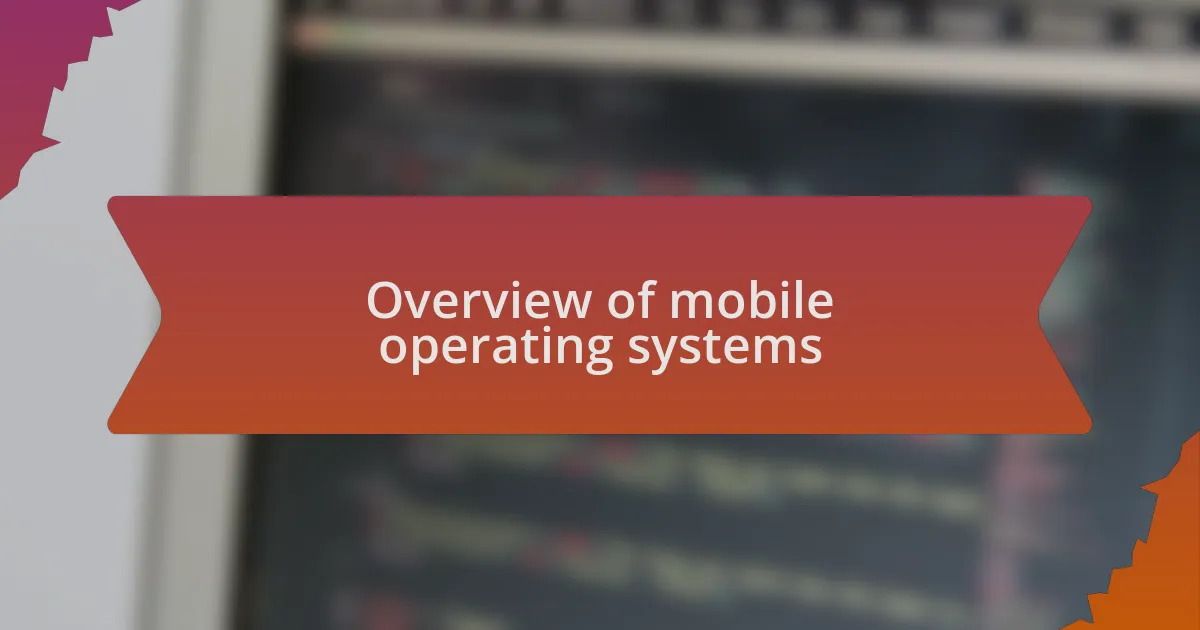
Overview of mobile operating systems
Mobile operating systems come in various forms, each tailored for different hardware and user needs. I often find it surprising how these systems can vary so widely in terms of usability and features. For example, when I switched from iOS to Android, I was struck by the customization options, which made me feel more in control of my device.
The evolution of mobile operating systems has been nothing short of remarkable. I still remember the early days of smartphones when apps were few but amazing in their novelty. It’s incredible to think how these systems have matured, allowing for richer user experiences with advanced functionalities like multitasking and gesture controls. Have you ever pondered how our smartphones can now do things we once thought were only possible on computers?
Moreover, the competitive landscape among mobile operating systems fuels innovation, pushing each platform to improve continuously. I vividly recall the excitement of updates; each new version came with features that transformed my device’s capabilities, making everyday tasks feel less tedious and more exciting. It’s fascinating to see how these updates not only improve performance but also shape our expectations of technology.
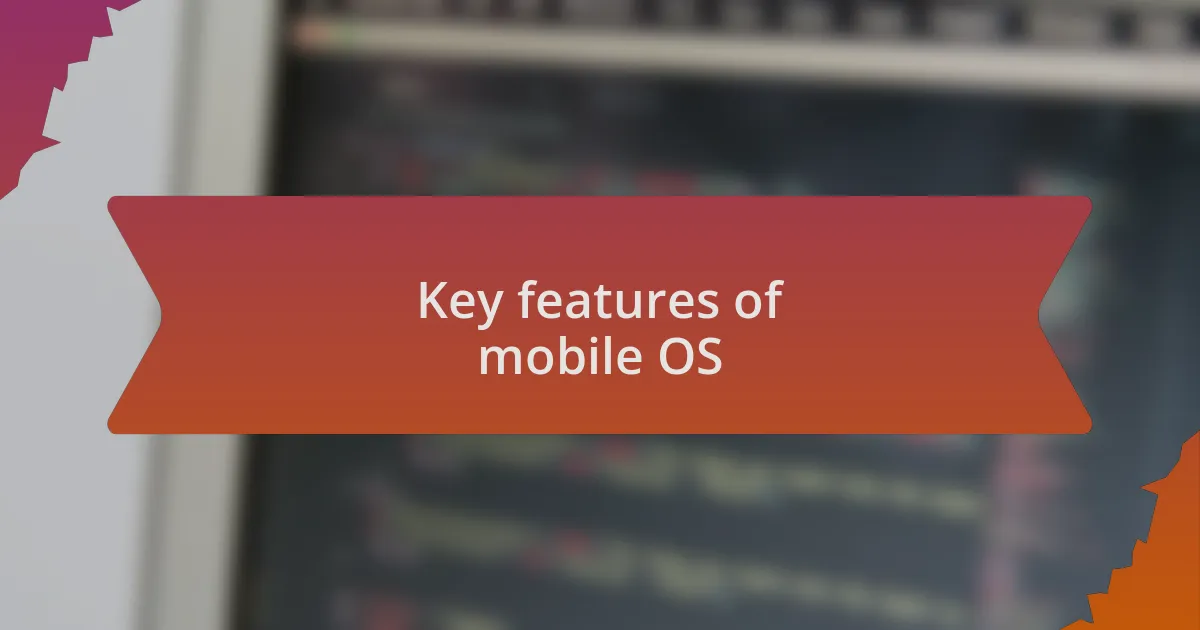
Key features of mobile OS
Key features of mobile OS
One of the standout characteristics of mobile operating systems is their user interface (UI) design. I remember my first encounter with a sleek, intuitive interface on a touchscreen device; it was a game changer. A well-designed UI not only enhances accessibility but also transforms how we interact with technology daily. Have you ever noticed how much easier it is to navigate a system that feels natural, almost like an extension of your own thoughts?
Another critical feature is app compatibility. I’ve experienced the frustration of realizing that some applications are exclusive to certain operating systems. It’s quite a journey trying to find alternatives, but it also showcases how tightly connected apps are to the mobile OS. This dependency shapes user loyalty; I often find myself sticking with the ecosystem that offers the best tools for my needs. Isn’t it interesting how our choices are often swayed by the availability of essential apps?
Security features are also paramount in today’s mobile landscape. I remember feeling uneasy about privacy when I first started using mobile devices, but advancements in features like biometric authentication and encryption have put me at ease. It’s reassuring to know that these systems continually adapt to protect our personal information, reflecting a growing awareness of the importance of security in our digital lives. Don’t you think it’s crucial that our devices not only serve us but also keep our data safe?
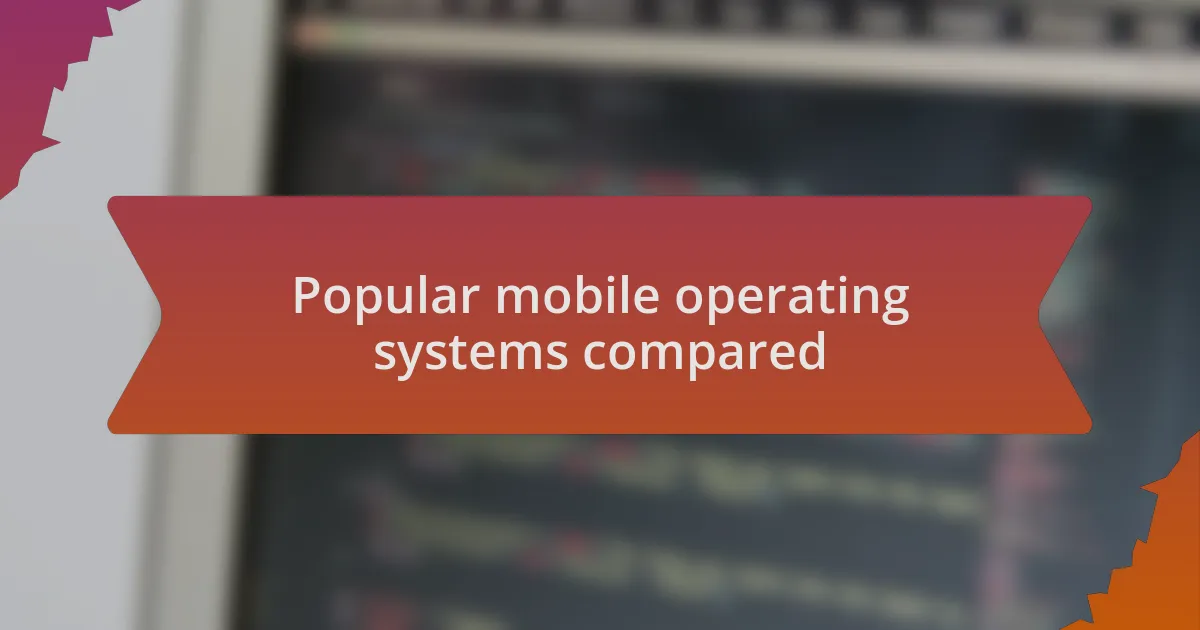
Popular mobile operating systems compared
When comparing popular mobile operating systems, Android and iOS often come to the forefront. Both have devoted user bases and distinct ecosystems, but I’ve found each brings its own flavor to the table. For instance, while Android offers a wider range of devices and customization options, I appreciate iOS for its seamless integration across all Apple products. Isn’t it fascinating how our preferences can reflect our broader lifestyle choices?
Moreover, let’s not overlook the role of updates and support in this comparison. I recall being frustrated with an older Android device that struggled with timely updates, which could leave security vulnerabilities open. In contrast, iOS devices typically receive regular updates for several years. How does your device’s longevity influence your overall satisfaction with a mobile OS?
Lastly, the app ecosystems reveal stark contrasts that can sway user opinions. I often find myself drawn to the App Store’s curated selection, which feels more polished, compared to the sprawling variety offered by Google Play. Each platform presents unique experiences, and how they cater to our specific needs can certainly shape our long-term loyalty. Have you ever had a favorite app that guided your choice on which OS to use?
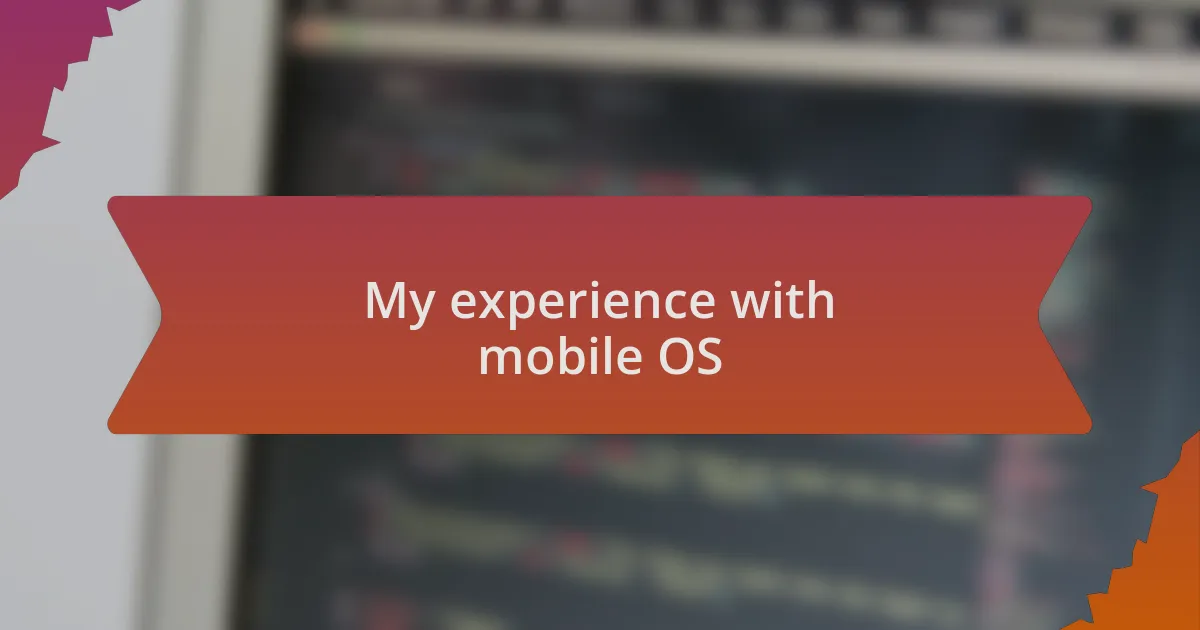
My experience with mobile OS
Thinking back on my journey with mobile operating systems, I find the contrasting experiences quite striking. I remember my first smartphone running Android — it was liberating to customize my home screen with widgets and shortcuts. However, it also came with the occasional glitch, which sometimes made me question whether the freedom was worth the frustration. Does that creative control resonate with you, or do you prefer a more structured experience?
Transitioning to iOS felt like stepping into a well-orchestrated symphony. I vividly recall the first time I used AirDrop to quickly share photos with friends. The simplicity amazed me and left a lasting impression on how seamless Apple’s ecosystem can be. Do you think this kind of integration can sway your loyalty toward a specific operating system?
Over the years, I’ve often reflected on how each mobile OS impacts my productivity. With Android, I often found myself juggling apps, while iOS tends to facilitate smoother multitasking. It makes me wonder, how much does the efficiency of your device affect your daily routine? For me, these subtle differences can turn frustration into satisfaction or vice versa.

Why I prefer my choice
Choosing between Android and iOS boils down to personal preference shaped by experience. I remember when I first explored the Google Play Store — the diversity of apps made it feel like a treasure trove, allowing me to dive into niche interests. That freedom of choice is exhilarating; it’s almost like curating my own technology experience. Have you ever felt that thrill of unfolding potential before you?
On the flip side, when I switched to iOS, I felt a newfound sense of stability. The reliability of software updates and security measures gave me peace of mind that I hadn’t realized I was missing. I vividly remember sharing a laugh with friends as we used the iMessage effects feature during a group chat. Moments like that make me appreciate how a cohesive suite of features can enhance social interactions. Isn’t it fascinating how technology can deepen our connections?
Overall, my strong inclination towards a particular mobile OS stems from these unique experiences. The seamless synchronization between my devices on iOS meant fewer barriers, making my day-to-day tasks feel less burdensome. How has the efficiency of your mobile OS shaped your routines? For me, enjoying a consistent workflow significantly boosts my productivity and overall satisfaction.
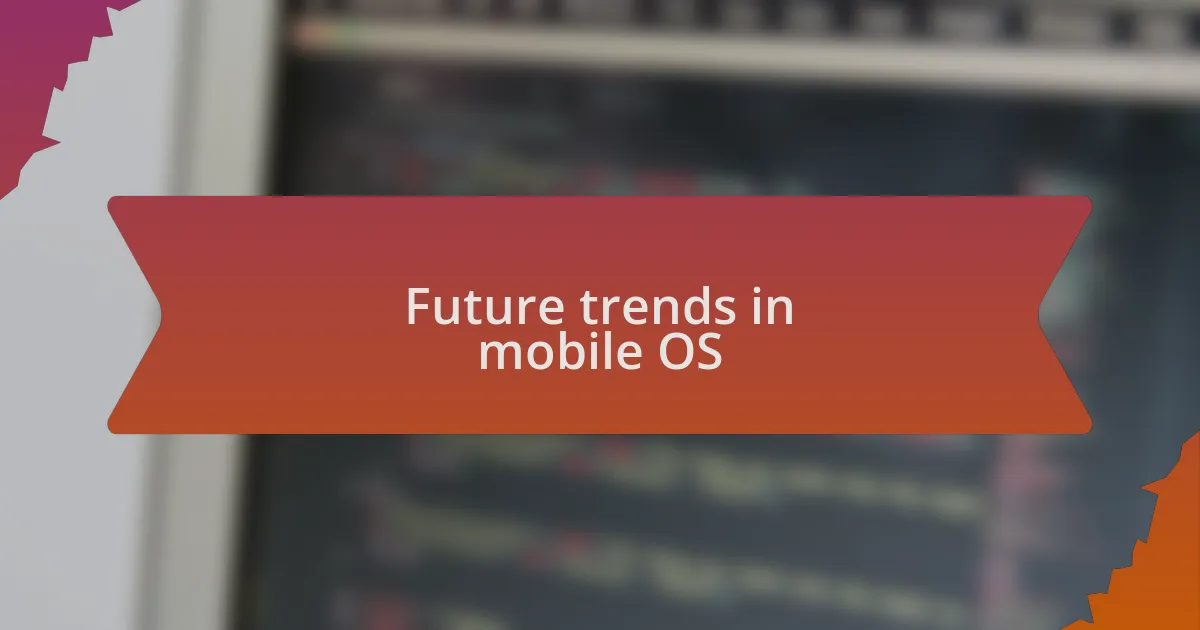
Future trends in mobile OS
As we look to the future of mobile operating systems, I see an increasing focus on integration with artificial intelligence. Imagine your device learning your habits, predicting your needs before you even think of them. I recall a moment when my voice assistant proactively suggested the quickest route home during a hectic day; it felt like having a personal assistant who understood my life. Could this level of intuitive support redefine how we interact with our devices?
Another trend is the growing emphasis on privacy and user control. Recently, I found myself more concerned about the data I share. When iOS introduced features to enhance transparency regarding app tracking, I felt empowered, like I was finally taking back the reins on my personal information. Isn’t it reassuring to see that future mobile OS designs are prioritizing our digital autonomy?
Lastly, I believe we’ll see shifts towards more sustainable mobile technologies. With the environmental impact of electronic waste becoming increasingly prominent, I hope future operating systems will prioritize long-term device usability and energy efficiency. I often think about how reducing our carbon footprints starts with conscious technology choices. How do you envision your next mobile device contributing to a greener planet?